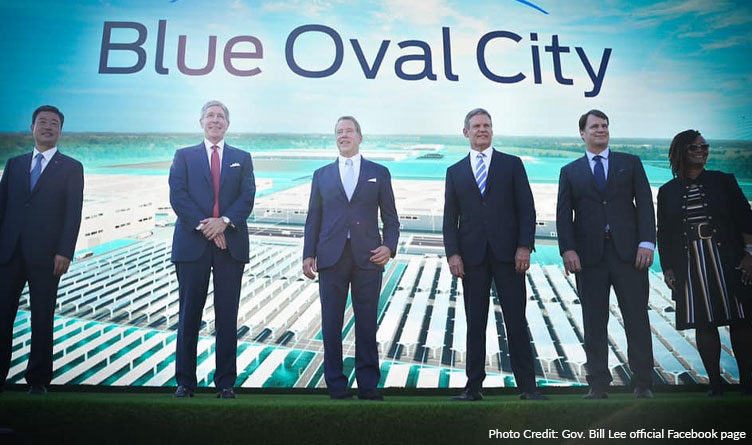Gov. Bill Lee with state officials and representatives of Ford Motor Co. and SK Innovation. (Photo: Gov. Bill Lee official Facebook page)
The Center Square [By Jon Styf] –
Construction on Ford’s Blue Oval City is set to begin in March on 3,600 acres of the West Tennessee Regional Megasite and logistics are now a large question.
Tennessee Department of Economic & Community Development (TNECD) Commissioner Bob Rolfe said Walbridge, the Michigan contractor hired to build the $5.6 billion Ford F-Series electric truck plant, has left subcontractors in charge of the logistics of getting workers to the site.
Rolfe said he believes that will mean a lot of commuters coming from Memphis and Jackson as the site is built.
Rolfe gave an update Monday on the project, expected to ultimately bring 5,760 jobs to Tennessee, at a budget hearing in the House Finance, Ways and Means Committee.
*** Click Here to Support Conservative Journalism in Tennessee. We can’t bring you stories like this without your support!***
Rep. Chris Todd, R-Madison County, said he has asked the Tennessee Department of Environment & Conservation about RV parking on the site and is worried there have not been a lot of requests from contractors related to the project yet.
“They really haven’t had any inquiries of what the local capacity is for wastewater,” Todd said. “I would have thought there would be work done 5-6 months ago. They’re going to have to park somewhere. There’s no hotels.”
Brooxie Carlton, assistant commissioner of Community and Rural Development for the TNECD, said “there honestly isn’t a great solution for where those folks can go because there is not a lot of RV parking or temporary spaces. I think that is one of those things keeping the mayors up at night.”
Rolfe said infrastructure needs ultimately will come along with the permanent workers in the area, comparing it with General Motors’ factory in Spring Hill, south of Nashville, that has seen the area grow from 1,500 residents in 1990 to 50,000 in the 2020 U.S. census.
Carlton said that the department is in the process of spending $4.5 million on a consultant to help plan out the local communities and their future infrastructure needs, including land use planning, water and sewer planning and schools.
Rolfe said Ford and SK Innovations, a South Korean company that has signed on to be a partner to build battery packs for the trucks on the site, are projected to make $265 million in payments over the next 30 years that will be collected by Tennessee and sent to the surrounding communities for those infrastructure improvements.
Rolfe acknowledged some in Tennessee are not pleased a Michigan company was hired to build the project and hire the many subcontractors that will build the campus. There have been two job fairs already in Memphis related to the project.
“We don’t dictate to companies who they contract with, wages, union or non-union,” Rolfe said. “In other states that assert themselves, they are quickly moved down the list (for future projects).”
Rolfe said another opportunity will come when 10 to 12 new suppliers arrive in Tennessee related to the Ford facility. He said he could not name the companies yet, but some will be building separately from the megasite.
Those companies would be eligible for the TNECD FastTrack grant program if they are independent suppliers. FastTrack grants are state grants sent to local governments for specific infrastructure improvements or to companies to help offset the costs of expanding or moving into the state with the goal of increasing the number of full-time jobs and the average wages of jobs available in an area.
Gov. Bill Lee has $100 million in additional funding for FastTrack grants is his proposed budget for next year.TNECD has a $467 million balance in the FastTrack account with $170 million of that contracted but not-yet-paid-for announced projects, $103 million for committed but not-yet-announced projects and $192 million worth of offers to companies that have not committed.
“If companies with offers out decline, that goes back into the bucket,” said Paul Vandermeer, assistant commissioner of administration for the TNECD.
Rolfe also was asked Monday about child care for workers, something he said was Ford’s responsibility on the site and would be something found in local communities as workers move to the megasite area.
Rolfe also said the usual incentive approach, or giving an average of $6,000 in incentives for every net new job that meets the standard of paying at least the median wage in a community, didn’t apply to Ford.
Ford received $884 million in incentives from Tennessee’s General Assembly in an October special session.
“Blue Oval is a different world just because the GDP (gross domestic product) we think will develop about $3.5 billion a year on an annual basis,” Rolfe said. “That one is an outlier.”

About the Author: Jon Styf, The Center Square Staff Reporter – Jon Styf is an award-winning editor and reporter who has worked in Illinois, Texas, Wisconsin, Florida and Michigan in local newsrooms over the past 20 years, working for Shaw Media, Hearst and several other companies. Follow Jon on Twitter @JonStyf.






One Response
What are they going to do when electris vehicles fail?